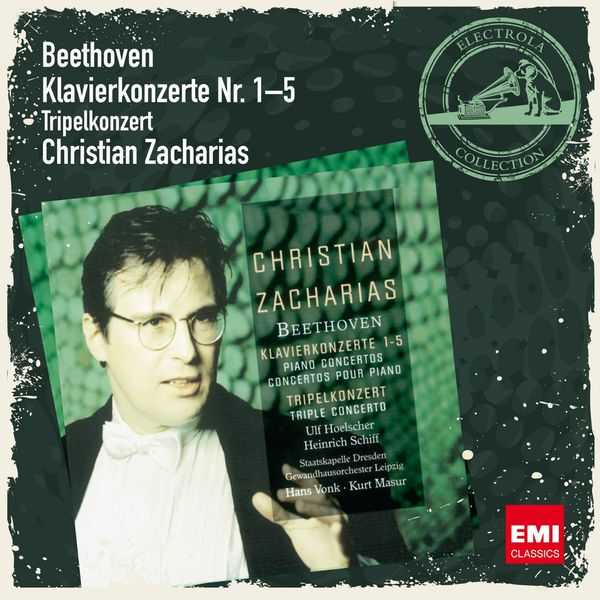
Composer: Ludwig van Beethoven
Performer: Christian Zacharias
Number of Discs: 3
Format: FLAC (tracks)
Label: EMI
Release: 2003
Size: 711 MB
Recovery: +3%
Scan: cover
CD 01
Piano Concerto No. 1 in C Major, Op. 15
01. I. Allegro con brio
02. II. Largo
03. III. Rondo. Allegro scherzando (Cadenza by Zacharias)
Piano Concerto No. 3 in C Minor, Op. 37
04. I. Allegro con brio
05. II. Largo
06. III. Rondo. Allegro
CD 02
Piano Concerto No. 2 in B-Flat Major, Op. 19
01. I. Allegro con brio
02. II. Adagio
03. III. Rondo. Molto allegro
Piano Concerto No. 4 in G Major, Op. 58
04. I. Allegro moderato
05. II. Andante con moto
06. III. Rondo. Vivace
CD 03
Piano Concerto No. 5 in E-Flat Major, Op. 73 “Emperor”
01. I. Allegro
02. II. Adagio un poco mosso
03. III. Rondo. Allegro
Triple Concerto for Violin, Cello and Piano in C Major, Op. 56
04. I. Allegro
05. II. Largo –
06. III. Rondo alla Polacca
Pianist Christian Zacharias and the Dresden Staatskapelle unequivocally prove that the Beethoven piano concertos need not be laden with romanticized notions such as excessive rubato, heavy pedaling, or forced dynamics. For Zacharias, simplicity is the key to his performance of the five concertos, and it’s an approach he pulls off masterfully. The interplay between soloist and orchestra is seamless; over the course of the five concertos, the two paint a clear picture of how changed the relationship between soloist and orchestra is in this genre. The orchestra’s vision of the music parallels Zacharias perfectly, with simplicity and cleanliness of sound being paramount. Tempo selection is also refreshingly logical. There’s no trace of outer movements being pushed too fast for the sake of virtuosity, nor the middle movements being held back in an artificial attempt to force emotionality. The second movement of the Fourth Concerto, for example, is the only middle movement in the piano concertos to be marked Andante rather than Adagio or Largo. Yet all too often, this movement is performed abysmally slow. Zacharias breaks that mold with a refined and insightful brisker tempo. The only thing EMI is missing in this collection is a more comprehensive set of liner notes; two small pages is not nearly enough to discuss the musical and historical significance of these works and both soloist and orchestra deserve some mention, as well. Nevertheless, this three-disc set makes a very nice, complete collection of the piano concertos.